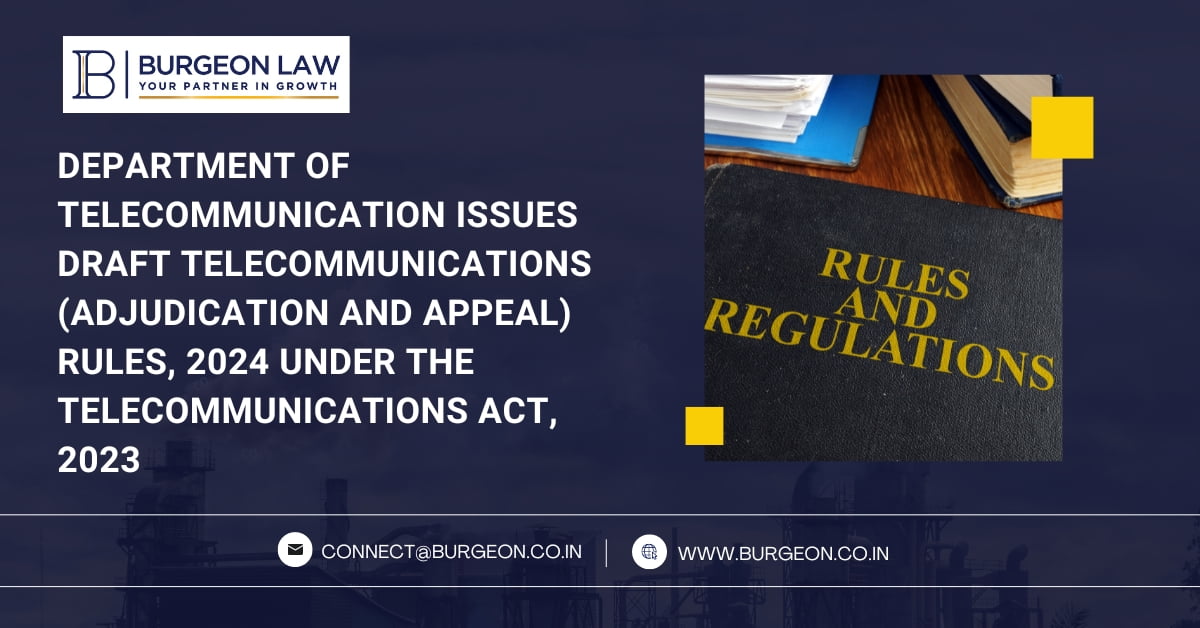Table of Contents
ToggleBackground
With the aim of laying down a set procedure towards investigating complaints and taking suo-moto actions into non-compliance with the terms of the Telecommunication Act, 2023 (“Act”), the Ministry of Communication, through the Department of Telecommunication has issued the Draft Telecommunications (Adjudication and Appeal) Rules, 2024 dated: July 18, 2024 (“Draft Rules”). The Draft Rules, proposed under sections 35, 36 and 37 of the Act, prescribe the criteria for the appointment of Adjudicating Officers (AOs) and Designated Appeals Committees (DACs) by the Central Government and outlines the procedures through which the AOs and DACs address breaches of telecom licenses, radio frequency assignments and other contraventions under the Act.
Procedure for Inquiries stipulated under the Draft Rules
A complaint against any contravention as specified in the Third Schedule (Civil Penalties for Certain Contraventions) of the Act, can be filed by any individual before the Adjudicating Officer, along with fees of INR 5000/- (Indian Rupees Five Thousand), in such form as may be specified by the Central Government and shall be accompanied by identity proof of the complainant issued by the Central or State Government, and specific evidence supporting such alleged contravention.
In cases where the Adjudicating Officer has reasonable grounds to believe, either suo moto, or upon a prima facie assessment of a complaint received, that there has been a contravention under section 32(1) of the Act (Breach of terms and conditions of authorisation or assignment) and/or under Schedule III of the Act, the Adjudication Officer shall issue a notice to the person alleged to have committed such contravention, to show cause within such period as may be specified in the notice, but the same shall not be less than 15 (fifteen) calendar days from the date of service thereof.
In case the Adjudicating Officer determines there is a need for further proceedings, post the respondent submitting the documentary evidence against the show-cause notice, the Adjudicating Officer may issue a second notice fixing the date for the respondent to appear before them. On such a date, the offending party must present its case and produce such documents or evidence as relevant to the subject matter of the inquiry. If the respondent fails to appear before the Adjudicating Officer, the Adjudicating Officer can carry out the proceedings in their absence.
The Adjudicating Officer possesses the powers of a civil court, including the ability to summon and compel a person’s appearance to verify case facts and issue interim orders.
If the Adjudicating Officer has enough evidence to suggest non-compliance by the offending party, they can–
- Direct the telecom service or spectrum assignee to abstain from doing any act that constitutes a breach, or ask them to act in ways that ensure compliance,
- Impose civil penalties as specified under the Act,
- Make recommendations to the Central Government regarding suspension, revocation, or curtailment of the duration of the authorization or assignment of the offending party.
The Adjudicating Officer must specify the violated provisions of the Act in every order they pass. If the order imposes a penalty, such penalties must have due regard for any voluntary undertakings submitted by the offending party. These voluntary undertakings are an admission of non-compliance and propose measures to address the situation. If a party submits such an undertaking before an inquiry, the officer will not take any proceedings or actions unless the party fails to comply with the undertaking.
The Adjudicating Officer shall normally conclude the inquiry within a period of 90 (Ninety) calendar days from the date of issuance of the show-cause notice to the offending party. However, the Adjudicating Officer may, upon recording of cogent reasons in writing, extend such period, for a period not exceeding 120 (One Hundred and Twenty) calendar days.
Procedure for Appeal against the Adjudication Officer’s Order
Any party (“Appellant”) aggrieved by the decision of the Adjudicating Officer can submit an appeal to the Designated Appeals Committee within a period of 30 (Thirty) days from the date of receiving the order from the Adjudicating Officer. The Appellant under the filed appeal shall include under distinct heads, the grounds of objection to the order and must submit the appeal with a fee of INR. 10,000/- (Indian Rupees Ten Thousand).
The Designated Appeals Committee will send a copy of the order being appealed and the appeal itself to the respective Adjudicating Officer. The Designated Appeals Committee will then issue notices to the Appellant and the Adjudicating Officer, fixing a date for the hearing. If the appellant or the Adjudicating Officer fail to appear when the appeal is called for hearing, the Committee can decide the appeal based on-
- The written submissions of the Appellant; and/or
- The order of the Adjudicating Officer on record.
Any person aggrieved by an order of the Designated Appeals Committee in so far as it pertains to matters relating to breach of terms and conditions of authorization or assignment may prefer an appeal to the Telecom Disputes Settlement and Appellate Tribunal constituted under section 14 of the Telecom Regulatory Authority of India Act, 1997, within a period of 30 (Thirty) days from the date on which a copy of the order is received by such person. Where the case in question was related to non-compliance with other provisions of the Act, the appeal can be filed before a civil court having the respective jurisdiction.
Conclusion
Even though Draft Rules are currently undergoing public consultation till 17th August 2024, the introduction of the same by the Department of Telecommunication is a welcome move in the right direction toward streamlining the process of raising complaints, and adjudication of non-compliances under the provisions of the newly introduced Act.
Author: Abhisshek Singlla
Co-Author: Prajjwal Sharma

